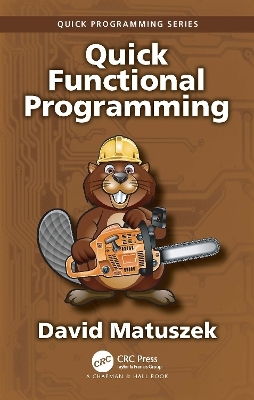
Quick Functional Programming
Seiten
2023
Chapman & Hall/CRC (Verlag)
978-1-032-41531-4 (ISBN)
Chapman & Hall/CRC (Verlag)
978-1-032-41531-4 (ISBN)
“Pure” functional programming, abandoning all the conventional programming techniques, really is difficult.Whether you're looking for a crash course in Functional Programming for career progression or supplementary material for a programming course, this book will enable you to quickly add Functional Programming to your programming toolkit.
Why learn functional programming? Isn’t that some complicated ivory-tower technique used only in obscure languages like Haskell?
In fact, functional programming is actually very simple. It’s also very powerful, as Haskell demonstrates by throwing away all the conventional programming tools and using only functional programming features. But it doesn’t have to be done that way.
Functional programming is a power tool that you can use in addition to all your usual tools, to whatever extent your current mainstream language supports it. Most languages have at least basic support.
In this book we use Python and Java and, as a bonus, Scala. If you prefer another language, there will be minor differences in syntax, but the concepts are the same.
Give functional programming a try. You may be surprised how much a single power tool can help you in your day-to-day programming.
Why learn functional programming? Isn’t that some complicated ivory-tower technique used only in obscure languages like Haskell?
In fact, functional programming is actually very simple. It’s also very powerful, as Haskell demonstrates by throwing away all the conventional programming tools and using only functional programming features. But it doesn’t have to be done that way.
Functional programming is a power tool that you can use in addition to all your usual tools, to whatever extent your current mainstream language supports it. Most languages have at least basic support.
In this book we use Python and Java and, as a bonus, Scala. If you prefer another language, there will be minor differences in syntax, but the concepts are the same.
Give functional programming a try. You may be surprised how much a single power tool can help you in your day-to-day programming.
David L. Matuszek was Director of the Masters in Computer and Information Technology course at the University of Pennsylvania, USA (2001-2017). With 40 years teaching experience, and 45 years programming experience, David is skilled in both the design of innovative software systems and in teaching others how to master programming languages in an accessible and engaging way.
1. What Is Functional Programming? 2. Methods and Functions 3. Higher-Order Functions 4. Functional Interfaces in Java 5. If Expressions 6. Comprehensions 7. Closures 8. Currying 9. Function Composition 10. Optional Values 11. Lists 12. Streams 13. Important Functions 14. Pipelines 15. Summary and Final Examples. Afterword. Index.
| Erscheinungsdatum | 11.07.2023 |
|---|---|
| Reihe/Serie | Quick Programming |
| Zusatzinfo | 6 Tables, black and white; 1 Line drawings, black and white; 1 Illustrations, black and white |
| Sprache | englisch |
| Maße | 138 x 216 mm |
| Gewicht | 440 g |
| Themenwelt | Geisteswissenschaften ► Psychologie ► Allgemeine Psychologie |
| Mathematik / Informatik ► Informatik ► Software Entwicklung | |
| Mathematik / Informatik ► Informatik ► Theorie / Studium | |
| ISBN-10 | 1-032-41531-2 / 1032415312 |
| ISBN-13 | 978-1-032-41531-4 / 9781032415314 |
| Zustand | Neuware |
| Informationen gemäß Produktsicherheitsverordnung (GPSR) | |
| Haben Sie eine Frage zum Produkt? |
Mehr entdecken
aus dem Bereich
aus dem Bereich
Techniken der Verhaltenstherapie
Buch (2024)
Julius Beltz GmbH & Co. KG (Verlag)
35,00 €


